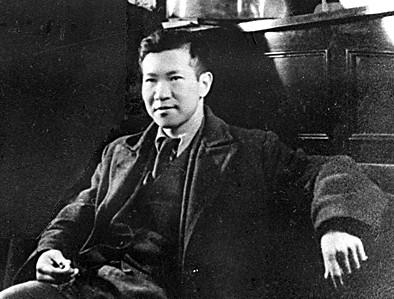【Striving for a hundred years to set sail on a new journey· a number of popular characters】
On the recent "International Museum Day", museums around the world have launched a wealth of exhibitions and activities, making these venues carrying history and culture once again become popular punch cards. Xian Xinghai's biography exhibition hall, located in the Panyu Museum in Guangzhou, has also welcomed more audiences recently. People came to admire the struggle and life of the people's musician Xian Xinghai and feel the revolutionary spirit.
Xian Xinghai, a great musician in modern and modern China, is a member of the Communist Party of China. Originally from Panyu, Guangdong Province, he was born in Macau to a poor family of boatmen. At the age of 7, Sin earned a living with her mother in Malaya and participated in the school orchestra while attending school in Singapore. In 1918, he returned to China to study violin at the Affiliated High School of Lingnan University, and after 1926, he entered the Institute of Music Of Peking University and the Music Department of the National Art College. In 1928, Xian Xinghai entered the Shanghai National Conservatory of Music to study violin and piano, and published the famous musical essay "Universal Music".

Xian Xinghai was like Xinhua News Agency
In 1929, Xian Xinghai went to Paris to study work-study under the famous violinist Pani Obedofell and the famous composer Paul Ducas. In 1931 he was admitted to the Conservatoire de Paris, where he studied composition at Shora Cantorum. During his stay in France, he composed more than ten works such as "Wind", "Wandering Ziyin", and "Violin Sonata in D minor".
After returning to China in 1935, Xian Xinghai actively participated in the Anti-Japanese Salvation Movement, composed a large number of combat mass songs, and composed music for progressive films such as "Top Gun", "Youth March", drama "Resurrection", "Great Thunderstorm" and so on. He also participated in the Second Team of Shanghai Salvation Drama. From 1935 to 1938, he composed various types of vocal works such as "National Salvation Army Song", "Only Afraid of Not Resisting", "Guerrilla Army Song", "The Road Is Open", "Vast Siberia", "Children of the Motherland", "Go Behind the Enemy", "On the Taihang Mountain" and so on. In 1938, Xian Xinghai went to Yan'an to serve as the head of the music department of Lu Xun Art Academy, and in addition to teaching at the "Women's University", he created the immortal masterpieces "Yellow River Chorus" and "Production Chorus".
In May 1940, Xian Xinghai was sent by the Party Central Committee to the Soviet Union to score the large-scale documentary "Yan'an and the Eighth Route Army", but was detained due to war and traffic barriers. During this period, he wrote the symphonies "National Liberation" and "Sacred War", the orchestral suite "Manjiang Hong", the orchestral "Chinese Rhapsody" and the violin song "Guo Zhier - Bidai", etc., and has collected nearly 300 of his works; in addition, he has also written a large number of music papers such as "Nie Er - The Creator of China's Emerging Music" and "On the National Forms of Chinese Music", and has published 35 articles.
Lung disease worsened by long-term fatigue and malnutrition, and Xian Xinghai died of sea disease in Moscow in 1945.
In 2009, Xian Xinghai was elected as one of the "100 Heroic And Exemplary Figures Who Made Outstanding Contributions to the Founding of New China".
The sound of the Yellow River recalls the heroic martyrs, and the spirit of the Xinghai sea is passed down from generation to generation. Now in Guangzhou, the city and its citizens are commemorating this great people's musician in many ways and inheriting the spirit of Xinghai.
On Ersha Island, surrounded by the Pearl River, the Xinghai Concert Hall, named after Xian Xinghai, played melodious music countless times, making it a literary and artistic landmark of the city; in 1985, the Guangzhou Conservatory of Music was renamed xinghai Conservatory of Music, cultivating artistic professionals who passed on the "Xinghai Spirit" from generation to generation; on June 13, 2005, on the 100th anniversary of Xian Xinghai's birth, the Panyu Museum opened a special exhibition hall to carry forward Xian Xinghai's revolutionary spirit and extraordinary music...
"Xian Xinghai has contributed everything to the country and the nation, and his feelings of home and country are touching." Xiao Hua, an associate researcher at the Panyu Museum, said that through the opening of special exhibition halls, the holding of "New Era Red Culture Lecture Hall", story tour and other forms, the museum hopes to let more people understand Xian Xinghai's life deeds, so that the "Xinghai Spirit" of "perseverance, lofty ambitions, truth-seeking and pragmatic, and patriotic dedication" can be passed on.
(Xinhua News Agency, Guangzhou, May 23, reporter Deng Ruixuan)
Guangming Daily ( 2021-05-24 04 edition)
Source: Guangming Network - Guangming Daily